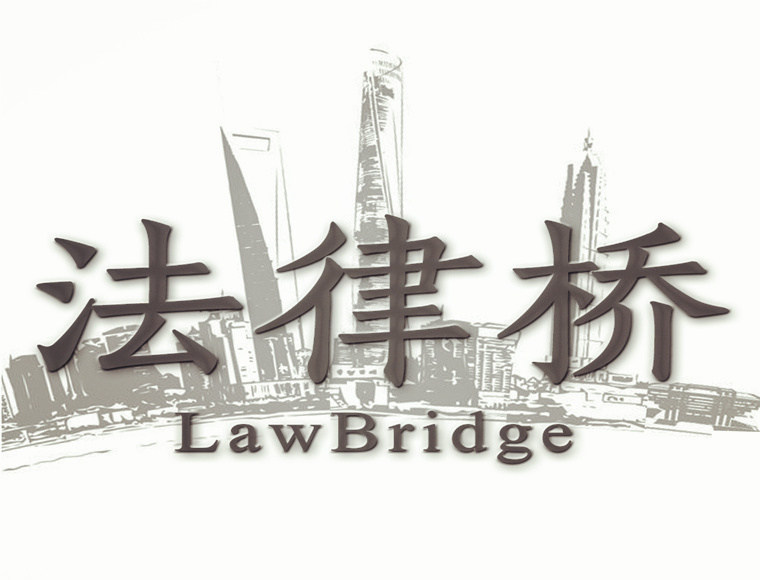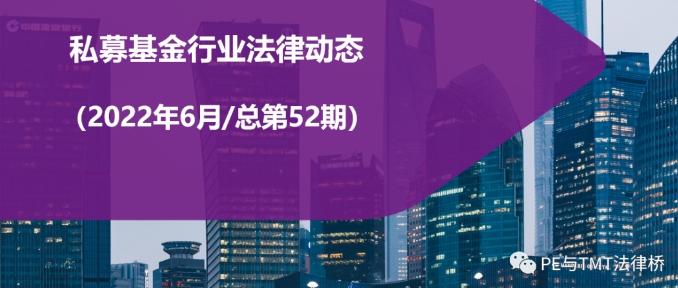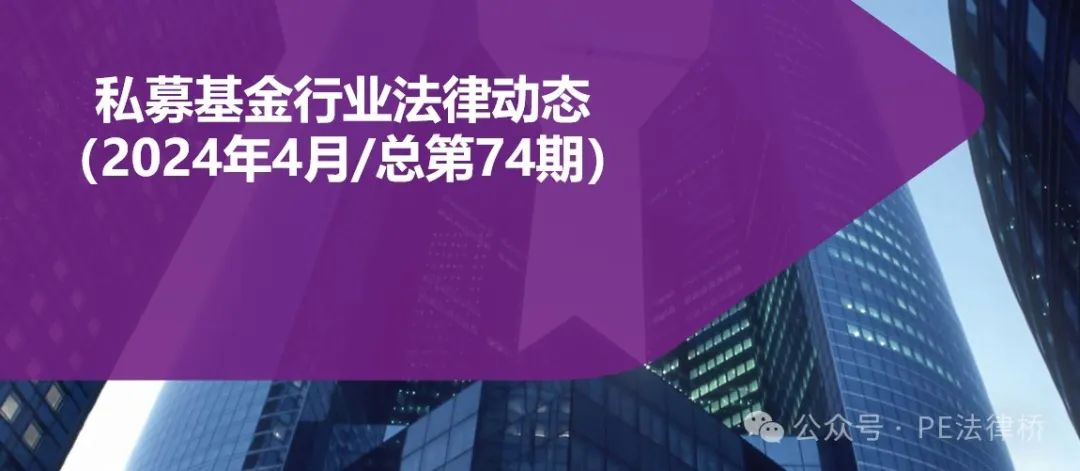Legal Trends in the Private Equity Industry (June 2024/Issue 76)
Legal service updates from Yang Chunbao's lawyer team
01
Yang Chunbao's first-class lawyer team assisted Huajin Capital and Wenzhou capital in completing the A round of investment in Jiaxing'an Dikang Biotechnology Co., Ltd.
02
Yang Chunbao's first-class lawyer team assisted Gotejia Investment's Gotejia Xiamen Ruilu Fund in completing its Series D investment in TowardPi Medical Technology , a leading Chinese high-end ophthalmic medical equipment company.
Various announcements and self-regulatory measures of the Fund Industry Association
1
Association's various announcements
The association issued an announcement on June 14, 2024, stating that five private equity fund managers including Qingdao Yongan Xinbang Investment Management Co., Ltd. have met the cancellation conditions after the public announcement period has expired for one month and have not proactively contacted the association and completed the situation report. Three institutions including Shanghai Runduo Asset Management Co., Ltd. cannot continue to meet the manager registration requirements. The association will cancel the private equity fund manager registration of these eight institutions.
The Association issued an announcement on June 21, 2024, stating that the Association was unable to effectively contact three private equity fund managers, including Beijing Yirun Asset Management Co., Ltd. The above-mentioned private equity fund managers shall submit a situation report through the AMBERS system within 5 working days from the date of this announcement. If it is not completed within the deadline, the Association will deem it as lost contact, publicize it in the column of lost contact institutions on the official website, and mark it in the "Institutional Integrity Information" column. If it is still not completed after one month of the public announcement, the Association will cancel its private equity fund manager registration.
The association issued an announcement on June 21, 2024, stating that six private equity fund managers, including Shandong Bank of America Investment Management Co., Ltd., had abnormal operating conditions and failed to submit special legal opinions in compliance with regulations within three months after the written notice was issued. The association will cancel the private equity fund manager registration of the six institutions.
2
Disciplinary sanctions of the association
The association issued a disciplinary decision on June 14, 2024, stating that Bozhi (Xiamen) Private Equity Fund Management Co., Ltd. had irregular fundraising practices, failed to disclose information to investors in accordance with the contract, and failed to establish and implement effective internal controls. The association decided to impose a disciplinary sanction of public reprimand on it.
The association issued a disciplinary decision on June 28, 2024, stating that Abi Vertical (Wuhan) Private Equity Fund Management Co., Ltd. used fund products to transfer benefits, failed to disclose information in accordance with the fund contract, failed to report major events to the association in a timely manner, and registered senior managers did not actually perform their duties. The association decided to impose a disciplinary penalty on Wuhan Abi Vertical to revoke the manager registration.
Regulatory developments
The first plenary meeting of the Legal and Self-discipline Supervision Committee of the FMAC
in 2024 was held
The Association's Legal and Self-Discipline Supervision Committee (hereinafter referred to as the "Committee") held its first plenary meeting in 2024 on June 7, 2024. The meeting pointed out that in 2023, the Association will make great efforts to carry out the "establishment, revision and abolition" of self-discipline rules, revising 9 items, formulating 14 items, and abolishing 18 items. In disciplinary sanctions, the Association focuses on cases where investors' interests are seriously damaged and the market has a bad impact, insists on severe accountability, and takes the top measures of "cancelling membership" and "revoking manager registration" for nearly 50% of the disciplined institutions. In addition, the meeting also emphasized the importance of the rule of law to the fund industry, and proposed to carry out the evaluation of the implementation of the Fund Law in a solid manner to lay the foundation for promoting the amendment of the law.
The State Council issued
"Several Policy Measures to Promote High-Quality Development of Venture Capital"
On June 15, 2024, the General Office of the State Council issued the "Several Policy Measures to Promote the High-quality Development of Venture Capital" to the people's governments of all provinces, autonomous regions, and municipalities directly under the Central Government, and all ministries and commissions of the State Council and all directly affiliated institutions. It clarified the overall requirements for promoting the high-quality development of venture capital, and proposed to cultivate diversified venture capital entities from four aspects: accelerating the cultivation of high-quality venture capital institutions, supporting the development of professional venture capital institutions, giving play to the role of venture capital funds funded by the government, and implementing and improving the state-owned venture capital management system; by encouraging long-term funds to invest in venture capital, supporting asset management institutions to increase their investment in venture capital, expanding the scope of the pilot program of direct equity investment by financial asset investment companies, and enriching the types of venture capital fund products to broaden the sources of venture capital funds; at the same time, strengthen government guidance and differentiated supervision of venture capital from the aspects of establishing a docking mechanism between venture capital and innovative and entrepreneurial projects, continuously implementing and implementing tax preferential policies for venture capital enterprises, and implementing differentiated supervision in line with the characteristics of venture capital funds; and broaden the exit channels for venture capital and optimize the exit policies of venture capital funds to improve the exit mechanism for venture capital; by establishing a consultation mechanism for new major policies on venture capital and supporting banks and venture capital institutions to strengthen cooperation, the venture capital market environment will be optimized.
Eight measures of the China Securities Regulatory Commission on
deepening the reform of the Science and Technology Innovation Board t
o serve technological innovation and the development of new productivity
In order to thoroughly implement the spirit of the Central Financial Work Conference and the "Several Opinions of the State Council on Strengthening Supervision, Preventing Risks and Promoting High-Quality Development of the Capital Market", the China Securities Regulatory Commission issued the "Eight Measures on Deepening the Reform of the Science and Technology Innovation Board to Serve Technological Innovation and the Development of New Productivity" on June 19, 2024. Focusing on deepening the reform of the Science and Technology Innovation Board to serve technological innovation and the development of new productivity, it proposed eight measures, including strengthening the "hard technology" positioning of the Science and Technology Innovation Board, carrying out pilot projects to deepen the issuance and underwriting system, optimizing the equity and debt financing system of Science and Technology Innovation Board listed companies, supporting mergers and acquisitions with greater efforts, improving the equity incentive system and strengthening the full-chain supervision of Science and Technology Innovation Board listed companies. Among them, at the level of measures to strengthen the full-chain supervision of Science and Technology Innovation Board listed companies, it is clearly stated that the "reverse linkage" system for the exit of private equity venture capital funds will be optimized, and reasonable reduction demands will be supported.
Keynote speech by Wu Qing, Chairman of the China Securities Regulatory Commission,
at the opening ceremony of the 2024 Lujiazui Forum
On June 19, 2024, Wu Qing, Chairman of the China Securities Regulatory Commission, delivered a keynote speech at the opening ceremony of the 2024 Lujiazui Forum, discussing the topic of high-quality financial development from three aspects: actively embracing the development of new productivity, vigorously promoting listed companies to enhance investment value, and insisting on protecting investors throughout the entire process of capital market system construction and regulatory enforcement. Chairman Wu Qing mentioned that technological innovation is the core element of developing new productivity. Technological innovation enterprises usually have characteristics such as high investment, long cycle, and great operating uncertainty, which are highly consistent with patient capital that adheres to "long-termism" in nature. The China Securities Regulatory Commission will work with relevant parties to actively create conditions to attract more medium- and long-term funds to enter the capital market, optimize support policies around the entire chain of venture capital and private equity investment "raising funds, investing, managing and exiting", guide better investment in early, small and hard technology, and promote a virtuous cycle of "technology-industry-finance".
Industry News
According to the statistics of PEDATA MAX, a private equity fund under Zero2IPO, there were 314 investment, listing and M&A events from June 1, 2024 to June 28, 2024, involving a total disclosed amount of RMB 71.907 billion. Among them, there were 213 investment events, of which 165 disclosed amount events, totaling RMB 33.544 billion; there were 86 M&A events, with a disclosed transaction amount of RMB 30.002 billion; there were 15 companies listed, with a total financing amount of RMB 8.361 billion.
Typical Cases
The risk disclosure obligation of a private equity fund manager is not the same as the suitability obligation. Merely disclosing risks to investors cannot prove that the manager has fulfilled the duty of care to understand the client, understand the product, and ensure that the two match. This is a violation of the suitability obligation of investors, and the manager should compensate the actual losses suffered by investors as a result. Investors who rashly invest without fully understanding the transaction content and transaction risks of the products they invest in are also at fault and need to bear certain responsibilities for their own investment losses.
Case
A dispute over a financial management contract between a certain investment management company and Dong [(2023) Jing 74 Min Zhong No. 1830]
Main Facts
In November 2015, Dong transferred RMB 1.5 million to a designated account of an investment company to purchase the contract fund involved in the case managed by the investment company. The following month, Dong signed a Fund Contract with the investment company. The Fund Contract stated that the fund involved in the case was mainly used to invest in the equity of a cultural investment company (the "target company"), and the fund's duration was expected to be 24 months from the date of the fund's establishment; in addition, it also disclosed various risks that the fund might face. The signatures of all parties were shown at the end of the Fund Contract. The Fund Contract also included a Risk Disclosure Letter, a Qualified Investor Commitment Letter, and an Investor Notice, but none of them were signed by Dong. From December 2016 to January 2019, Dong received seven income transfers from the investment company. The 2017 Management Report of the fund involved in the case stated that the film bid by the fund involved in the case was postponed, and that the fund involved in the case had expired for 24 months. After repeated negotiations, the fund manager initiated the repurchase of the fund's investment shares, but has not received the repurchase funds so far. In December 2017, the fund manager brought the relevant repurchase obligor to court and applied for compulsory execution after winning the case, but failed to execute the full amount of the effective judgment on the equity repurchase lawsuit. In May 2020, the investment company issued a liquidation announcement for the fund involved in the case. In June 2021, Dong received a liquidation distribution, which, together with the income received previously, totaled 939,333.04 yuan, and faced investment losses. Dong claimed that an investment company had violated its suitability obligations and should bear liability for compensation for its investment losses. The manifestations of violations of suitability obligations include: failure to conduct a questionnaire survey, incorrect product risk rating, and failure to fulfill risk warning obligations. An investment company acknowledged that it did not conduct a questionnaire survey and that the risk of the investment project did not have corresponding grade parameters, but argued that risk warnings had been made in the contract.
案件
The court of first instance held that whether a certain investment company had fulfilled its suitability obligations. First, a certain investment company did not submit evidence to prove that it had conducted a questionnaire survey on Dong. Secondly, a certain investment company failed to provide evidence on the risk rating system and basis of the private equity fund involved in the case, and it should bear the legal consequences of failure to provide evidence. Thirdly, although a certain investment company claimed that there were risk warnings and risk commitments in many places in the "Fund Contract", indicating that it had fulfilled its risk warning obligations, the obligation to inform and explain risks cannot be equated with the obligation to inform and explain suitability. The obligation to inform and explain aims to alleviate the information asymmetry between the two parties to the transaction and to ensure that investors can make "informed consent" from a procedural perspective, while the obligation to inform and explain suitability is to prevent the selling institution from recommending unsuitable products in pursuit of its own interests and to impose on it a substantive obligation to ensure that the investment advice is appropriate. The "risk disclosure" clause in the "Risk Disclosure Book" and the "Fund Contract" cannot prove that it has fulfilled its duty of care to understand the customer, understand the product, and ensure that the two match. In summary, the court of first instance held that a certain investment company did not fulfill its suitability obligations when selling the private equity fund involved in the case to Dong.
In this case, because a certain investment company failed to execute all the funds of the effective judgment on the equity repurchase lawsuit, the fund involved in the case was not liquidated, but Dong's investment funds were not fully recovered, and his investment losses had actually occurred. There is a certain causal relationship between the failure of a certain investment company to fulfill its suitability obligations as a fund manager and Dong's losses. Dong rashly paid the investment funds in pursuit of high returns from private equity funds without fully understanding the transaction content and transaction risks of the products he invested in, and he himself was also at fault. In summary, the first instance court determined that Dong should bear 20% of the responsibility for his investment losses, and a certain investment company should bear 80% of the compensation liability for Dong's investment losses. The second instance court upheld the original judgment.
If an investor entrusts the managing partner of a partnership to subscribe for and hold limited partnership shares on his behalf, the entrustment shall be deemed completed when the managing partner pays the investment funds to the partnership. If the partnership rights actually owned by the investor are not affected and the investment funds have been used for investment projects, even if the holding agreement is terminated, the court will not support the investor's claim for the return of the investment funds.
Case
Contract dispute between Wu et al. and a certain investment management company [(2023) Jing01 Minzhong No. 12278]
Main Facts
An investment management center (“A Asset Management Center”) was established in January 2015, and its executive partner is an investment management company (“Company B”). In December 2016, Wu (Party A) and Company B (Party B) signed an “Equity Holding Agreement”, which stipulated that Party A entrusted Party B to subscribe for 1 million yuan of limited partnership shares of A Asset Management Center, and the entrusted matters were all matters related to the limited partner status of A Asset Management Center. As the actual investor, Party A enjoys the actual limited partner rights and interests and is entitled to obtain the investment income of the corresponding shares of A Asset Management Center; Party B only invests Party A’s investment in A Asset Management Center in its own name and holds the rights and interests formed by such investment on behalf of Party A, but does not enjoy any income rights or disposal rights to the rights and interests formed by such investment. Both Party A and Party B can terminate the agreement unilaterally, and if they cause losses to the other party, they shall compensate for it. In the same month, Wu transferred 1 million yuan to Company B, which was summarized as Wu’s equity investment. Later, Company B transferred 1 million yuan to A Asset Management Center, which was summarized as investment funds. Afterwards, A Asset Management Center used the aforementioned investment funds to subscribe for the corresponding shares of the investment project, but the industrial and commercial registration of the amount of capital contribution held by Company B in A Asset Management Center has not changed so far. In June 2022, Wu mailed a "lawyer's letter" to Company B, claiming that Company B had not fulfilled the equity holding agreement, which constituted a breach of contract and that the contractual purpose of the agreement could not be achieved. He requested to terminate the equity holding agreement and return the 1 million yuan transferred to Company B's account and pay interest on the funds occupied. Company B did not make any response after receiving the lawyer's letter sent by Wu, so Wu sued to terminate the holding agreement involved in the case and requested Company B to return his investment and pay interest. During the first instance trial, Company B stated that it and A Asset Management Center could both issue relevant documents to Wu to confirm Wu's partnership share in A Asset Management Center. However, Wu still requested to terminate the agreement involved in the case and return his investment of 1 million yuan and interest. The first instance court rejected Wu's lawsuit, and Wu appealed.
裁判观点






















































First, please LoginComment After ~